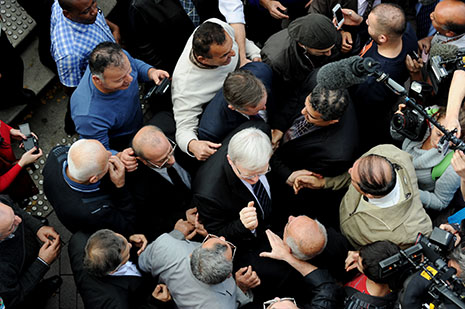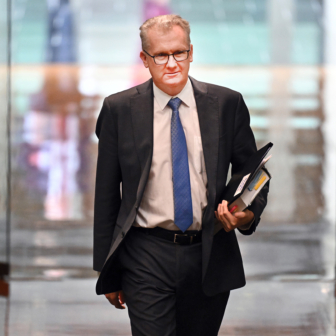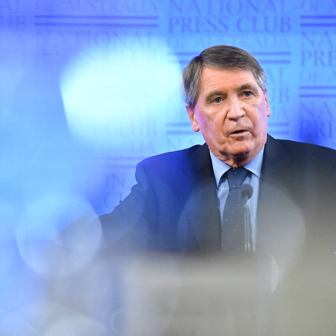CANBERRA’s often tense relationship with the rest of Australia is mostly characterised by some form of disconnect – originally chiefly geographic, but now more generally a sense of otherness. Somehow in the public mind the place is not quite like the rest of Australia; in it, but not of it.
Canberra hands down decisions, imposes taxes, makes rules and regulations; Canberra gets it wrong, doesn’t understand the “real” Australia. There is a simmering resentment, mostly subliminal but occasionally erupting. An example in the late 1990s was the sense of indignation, outrage even, when the ACT government insensitively added the slogan “Feel the power” to vehicle number plates. It didn’t last long. Visitors to the national capital protested and wrote letters to the paper; Canberrans themselves bristled at the arrogance that played to persistent anti-Canberra sentiment. Canberra got it wrong, very wrong.
The late John Button liked to refer to the popular TV satire of bureaucracy, Yes Minister (subsequently Yes, Prime Minister), with the observation that for most of Australia it was comedy, but in Canberra it was pure documentary. Demographically, Canberra is younger than the rest of Australia, more affluent and better educated. Politically, it is a tad perverse; according to a rare flash of wit from John Howard, it “looks like Killara but votes like Cessnock.” Howard also singled out the Canberra Times as the one newspaper that was consistently hostile towards him, once complaining to this writer: “Fair dinkum, if I was to walk across Lake Burley Griffin, the headline wouldn’t be ‘Howard walks on water,’ but rather ‘Howard snubs Comcar driver.’”
So Canberra is different, in so many ways. But perhaps there is no sharper disconnect than in the curious case of one Kevin Rudd, increasingly revered outside Canberra, but remembered with a shudder in the national capital.
There are, of course, two Kevin Rudds. The avuncular, ever-smiling figure, bravely bearing his wounds and humiliations, in endless cameos on morning television and, increasingly of late, on the evening news. The other Rudd, more familiar in Canberra, is the tantrum-prone prima donna, the micro-manager extraordinaire, whose ultra-short attention span and fixation on minor detail brought government to the brink of paralysis. This was the Rudd who drove public servants and staff to exhaustion on a whim, who pursued an age-old vendetta against a former foreign affairs colleague and who harrassed a hapless RAAF cabin attendant who served him the wrong food on a VIP flight.
Kevin Rudd rode into office in 2007 on a vast wave of political capital, restoring Labor to office after almost twelve years. The slick and hyperbolic Kevin ’07 campaign, which portrayed him as a political superhero, probably created unreal expectations, but he quickly set about lowering them. When Labor staffers at the time, most of whom had worked tirelessly during the campaign, gathered together for what was expected to be a victory celebration and a word of thanks, they were instead told by an unsmiling Rudd that they were all on notice and if anything went wrong, they were to be held responsible. It was an uneasy hint of what was to come. As one senior government official put it to me: “We all liked Kevin until we had to deal with him.”
Rudd’s failings as prime minister have largely been forgotten, or conveniently overlooked, outside Canberra. Not only did he simply walk away from the emissions trading scheme after calling climate change “the greatest moral challenge of our time.” Action on the broader front on climate change became bogged down in administrative detail and Rudd’s own failure to negotiate successfully. His plan to track petrol and grocery prices fell over and progress stalled on much-vaunted reforms in areas such as freedom of information.
The Senate’s blocking of more than forty bills was not just bloody-minded obstruction, as the government liked to complain, but was testimony to Rudd’s significant shortcomings as a negotiator. His predecessor, John Howard, in contrast, was a skilled and patient negotiator; he was also the ultimate pragmatist. Remember how he won over Tasmanian independent Brian Harradine on the sale of Telstra? And then Democrats’ leader, Meg Lees, to get the GST passed? Rudd never came close to a comparable score.
By early 2010 the gloss was wearing off Kevin ’07, and the big fear among senior ministers was that the Rudd they knew was starting to show glimpses of himself to the outside world. They blanched. They watched with growing alarm as his popularity dipped in two years from a stratospheric 70 per cent to just above 50 per cent.
The level of animosity Rudd’s name arouses in Canberra exceeds that even of Malcolm Fraser at his imperious height, the scourge of colleagues, staffers and officials alike. But as one veteran Liberal reminded me, there were those on Fraser’s side, often bruised by him, who could still shrug and say, “Oh, well, he’s a big bastard, but at least he’s our big bastard.” That same grudging tribal allegiance was never accorded to Rudd by his own.
Historically, the prime minister Rudd most resembles is the late John Gorton, who was little known until he was plucked from the obscurity of the Senate by a rattled Liberal Party in 1968 to take the helm when Harold Holt drowned. Gorton, who was deposed by his party in 1971, nurtured a deep centralism that contrasted starkly with the prevailing orthodoxy and personal ideologies of the powerful state parties and their influential leaders. In a sense, Gorton failed to understand his own party just as Rudd failed to understand his: each held office only so long as he retained the confidence of his immediate constituency, the party. Gorton was too wayward and erratic to see this; Rudd was too arrogant.
It is worth asking why the Labor Party entrusted the leadership to him in the first place. His ruthless undermining of the well-liked and respected Kim Beazley raised more than a few eyebrows, and there were enough senior figures who had seen him at work as a senior adviser to the Goss government in Queensland to be more than passingly aware of his modus operandi. Was it a calculated risk or a moment of madness? Some even reasoned that Rudd’s ruthless streak was precisely what Beazley lacked. This was the same party that only a few years before had put the enigmatic Mark Latham in charge, a courageous decision if ever there was one. And, going back further, the same party that had elevated the well-known and eccentric, if not unstable, Bert Evatt, and reaped the inevitable whirlwind that soon engulfed it and locked it out of office for a generation.
The Liberals don’t get it right all the time, either. The bizarre Bill McMahon was chosen to replace Gorton, the uninspiring Billy Snedden was tapped after the election loss in 1972, and, in a comedic twist, the Liberals briefly turned to Alexander Downer in the 1990s.
So, which Rudd will prevail? The real one known in Canberra or the totally confected one seen beyond the capital? The substance or the style?
This time, it seems, Canberra has got it right. But the rest of the country is not listening. •




